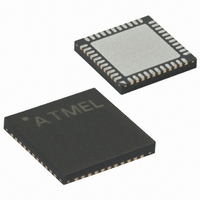ATMEGA162V-1MC Atmel, ATMEGA162V-1MC Datasheet - Page 197

ATMEGA162V-1MC
Manufacturer Part Number
ATMEGA162V-1MC
Description
IC MCU AVR 16K 1.8V 8MHZ 44-QFN
Manufacturer
Atmel
Series
AVR® ATmegar
Specifications of ATMEGA162V-1MC
Core Processor
AVR
Core Size
8-Bit
Speed
1MHz
Connectivity
EBI/EMI, SPI, UART/USART
Peripherals
Brown-out Detect/Reset, POR, PWM, WDT
Number Of I /o
35
Program Memory Size
16KB (8K x 16)
Program Memory Type
FLASH
Eeprom Size
512 x 8
Ram Size
1K x 8
Voltage - Supply (vcc/vdd)
1.8 V ~ 3.6 V
Oscillator Type
Internal
Operating Temperature
0°C ~ 70°C
Package / Case
44-VQFN Exposed Pad
Lead Free Status / RoHS Status
Contains lead / RoHS non-compliant
Data Converters
-
- Current page: 197 of 289
- Download datasheet (3Mb)
TAP Controller
Using the Boundary-
scan Chain
2513C–AVR–09/02
The TAP controller is a 16-state finite state machine that controls the operation of the
Boundary-scan circuitry, JTAG programming circuitry, or On-chip Debug system. The
state transitions depicted in Figure 84 depend on the signal present on TMS (shown
adjacent to each state transition) at the time of the rising edge at TCK. The initial state
after a Power-on Reset is Test-Logic-Reset.
As a definition in this document, the LSB is shifted in and out first for all Shift Registers.
Assuming Run-Test/Idle is the present state, a typical scenario for using the JTAG inter-
face is:
•
•
•
•
As shown in the state diagram, the Run-Test/Idle state need not be entered between
selecting JTAG instruction and using Data Registers, and some JTAG instructions may
select certain functions to be performed in the Run-Test/Idle, making it unsuitable as an
Idle state.
Note:
For detailed information on the JTAG specification, refer to the literature listed in “Bibli-
ography” on page 200.
A complete description of the Boundary-scan capabilities are given in the section “IEEE
1149.1 (JTAG) Boundary-scan” on page 201.
At the TMS input, apply the sequence 1, 1, 0, 0 at the rising edges of TCK to enter
the Shift Instruction Register – Shift-IR state. While in this state, shift the four bits of
the JTAG instructions into the JTAG instruction register from the TDI input at the
rising edge of TCK. The TMS input must be held low during input of the 3 LSBs in
order to remain in the Shift-IR state. The MSB of the instruction is shifted in when
this state is left by setting TMS high. While the instruction is shifted in from the TDI
pin, the captured IR-state 0x01 is shifted out on the TDO pin. The JTAG Instruction
selects a particular Data Register as path between TDI and TDO and controls the
circuitry surrounding the selected Data Register.
Apply the TMS sequence 1, 1, 0 to re-enter the Run-Test/Idle state. The instruction
is latched onto the parallel output from the Shift Register path in the Update-IR
state. The Exit-IR, Pause-IR, and Exit2-IR states are only used for navigating the
state machine.
At the TMS input, apply the sequence 1, 0, 0 at the rising edges of TCK to enter the
Shift Data Register – Shift-DR state. While in this state, upload the selected data
register (selected by the present JTAG instruction in the JTAG Instruction Register)
from the TDI input at the rising edge of TCK. In order to remain in the Shift-DR state,
the TMS input must be held low during input of all bits except the MSB. The MSB of
the data is shifted in when this state is left by setting TMS high. While the Data
Register is shifted in from the TDI pin, the parallel inputs to the Data Register
captured in the Capture-DR state is shifted out on the TDO pin.
Apply the TMS sequence 1, 1, 0 to re-enter the Run-Test/Idle state. If the selected
data register has a latched parallel-output, the latching takes place in the Update-
DR state. The Exit-DR, Pause-DR, and Exit2-DR states are only used for navigating
the state machine.
Independent of the initial state of the TAP Controller, the Test-Logic-Reset state can
always be entered by holding TMS high for five TCK clock periods.
ATmega162(V/U/L)
197
Related parts for ATMEGA162V-1MC
Image
Part Number
Description
Manufacturer
Datasheet
Request
R

Part Number:
Description:
Manufacturer:
Atmel Corporation
Datasheet:

Part Number:
Description:
IC AVR MCU 16K 16MHZ 5V 44TQFP
Manufacturer:
Atmel
Datasheet:

Part Number:
Description:
IC AVR MCU 16K 16MHZ 5V 40DIP
Manufacturer:
Atmel
Datasheet:

Part Number:
Description:
IC AVR MCU 16K 16MHZ 5V 44-QFN
Manufacturer:
Atmel
Datasheet:

Part Number:
Description:
IC MCU AVR 16K 5V 16MHZ 44-TQFP
Manufacturer:
Atmel
Datasheet:

Part Number:
Description:
IC MCU AVR 16K 5V 16MHZ 44-QFN
Manufacturer:
Atmel
Datasheet:

Part Number:
Description:
MCU AVR 16KB FLASH 16MHZ 44QFN
Manufacturer:
Atmel
Datasheet:

Part Number:
Description:
MCU AVR 16KB FLASH 16MHZ 44TQFP
Manufacturer:
Atmel
Datasheet:

Part Number:
Description:
IC MCU AVR 16K 5V 16MHZ 44-TQFP
Manufacturer:
Atmel
Datasheet:

Part Number:
Description:
IC MCU AVR 16K 5V 16MHZ 44-QFN
Manufacturer:
Atmel
Datasheet:

Part Number:
Description:
IC MCU AVR 16K 5V 16MHZ 40-DIP
Manufacturer:
Atmel
Datasheet:

Part Number:
Description:
IC MCU AVR 16K 5V 16MHZ 40-DIP
Manufacturer:
Atmel
Datasheet:

Part Number:
Description:
IC MCU AVR 16K 5V 16MHZ 44-TQFP
Manufacturer:
Atmel
Datasheet:










